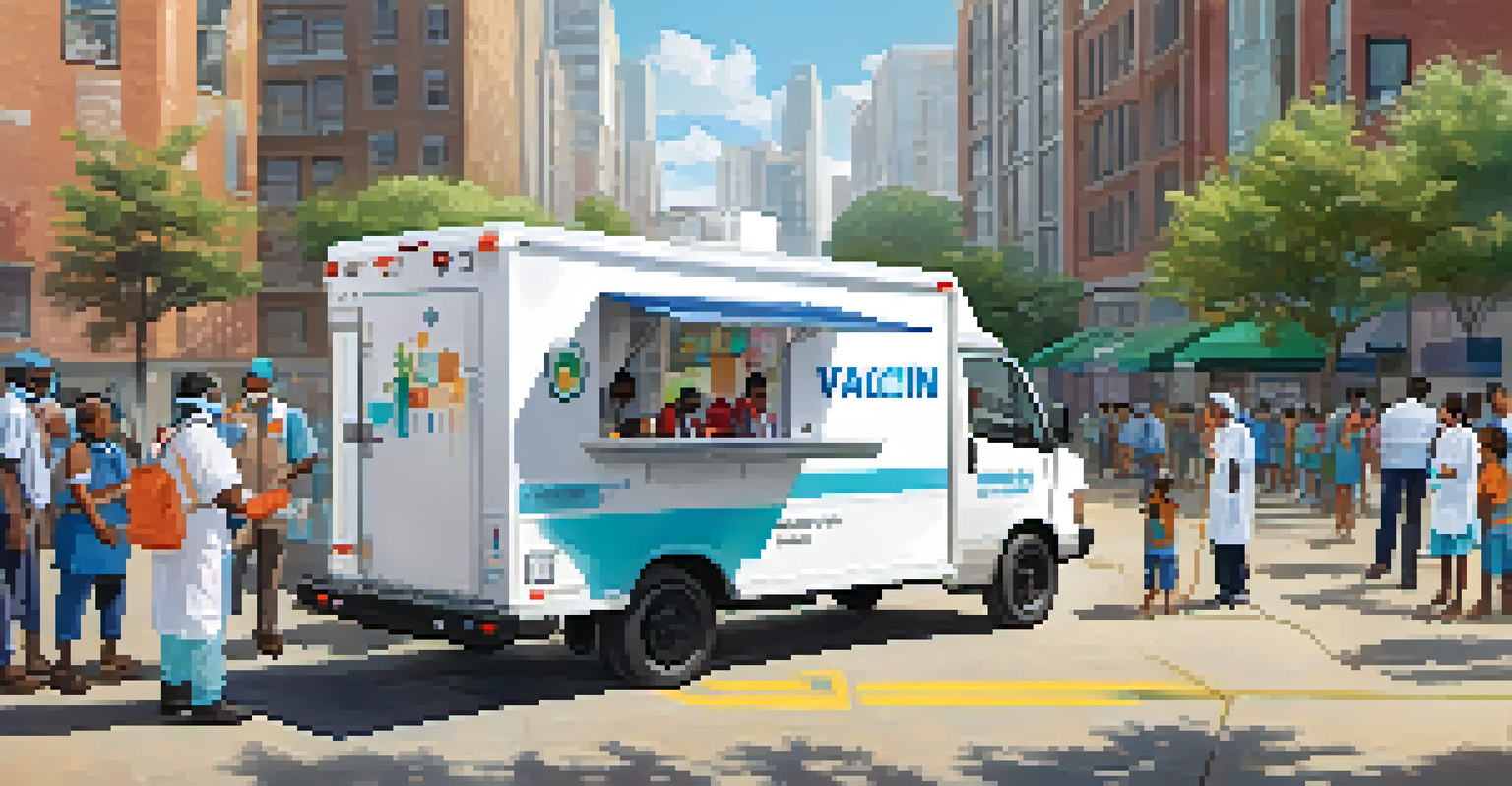California's Vaccination Programs: A Public Health Priority

The Importance of Vaccination in Public Health
Vaccination plays a crucial role in protecting public health by preventing the spread of infectious diseases. In California, the state has prioritized vaccination programs to ensure that communities remain safe and healthy. By achieving high vaccination rates, we can establish herd immunity, which protects those who cannot be vaccinated due to medical reasons.
Vaccines are the tugboats of preventive health.
For instance, outbreaks of diseases like measles can pose serious risks, especially to vulnerable populations such as infants and those with weakened immune systems. Vaccination not only helps to prevent individual illness but also contributes to the overall well-being of the community. The more people who are vaccinated, the less likely it is for diseases to spread, creating a healthier environment for everyone.
California's commitment to vaccination reflects its dedication to safeguarding public health. Through various initiatives and education campaigns, the state aims to raise awareness about the importance of vaccinations and dispel any myths surrounding them.
California's Vaccination Programs Overview
California offers a variety of vaccination programs targeting different demographics, from children to adults. Programs like the Vaccines for Children (VFC) initiative provide free vaccines to eligible children, ensuring that financial barriers do not prevent access. Additionally, the California Department of Public Health (CDPH) oversees vaccination efforts to maintain high immunization rates across the state.

In schools, vaccination requirements help to ensure that children are protected against preventable diseases before they enter the classroom. This proactive approach not only keeps kids safe but also contributes to the overall goal of minimizing disease outbreaks. Furthermore, adult vaccination programs focus on preventing illnesses such as influenza and shingles, which can have serious consequences for older adults.
Vaccination Protects Public Health
High vaccination rates help establish herd immunity, safeguarding vulnerable populations from infectious diseases.
The variety of programs available demonstrates California's comprehensive approach to vaccination, addressing the needs of diverse populations. By providing accessible and affordable options, the state aims to maximize participation and foster a healthier future.
Addressing Vaccine Hesitancy in Communities
Vaccine hesitancy remains a significant challenge in ensuring widespread vaccination coverage. Many individuals hold misconceptions about vaccines or fear potential side effects, leading to reluctance in getting vaccinated. California has recognized the importance of addressing these concerns through targeted outreach and education initiatives.
The greatest weapon against stress is our ability to choose one thought over another.
Community engagement plays a vital role in overcoming vaccine hesitancy. By partnering with local organizations and healthcare providers, California aims to provide accurate information and build trust within communities. For example, hosting informational sessions and providing resources in multiple languages can help dispel myths and encourage informed decision-making.
Additionally, sharing personal stories from individuals who have benefited from vaccination can resonate deeply with those on the fence. When people hear about real experiences, it can motivate them to prioritize their health and the health of their loved ones.
Innovative Approaches to Increase Vaccination Rates
California has implemented several innovative strategies to boost vaccination rates, particularly during public health campaigns. Mobile vaccination units, for example, have been deployed to reach underserved areas, making it easier for individuals to access vaccines. This approach not only increases convenience but also helps to eliminate barriers such as transportation challenges.
Social media campaigns have also proven effective in spreading awareness and encouraging vaccinations. By leveraging popular platforms, California can reach a wider audience with vital information about vaccine availability and the importance of immunization. Engaging content, such as videos and infographics, can capture attention and motivate people to take action.
California's Comprehensive Programs
The state offers diverse vaccination initiatives to ensure accessibility and affordability for all demographics.
Finally, collaborations with schools and workplaces further enhance vaccination efforts. By organizing vaccination clinics on-site, California can streamline the process, making it more convenient for individuals to get vaccinated while minimizing disruption to their daily routines.
California's Response to Emerging Health Threats
The COVID-19 pandemic has underscored the importance of robust vaccination programs in California. In response, the state rapidly rolled out its vaccination campaign, prioritizing vulnerable populations and frontline workers. This quick action not only helped to curb the spread of the virus but also highlighted the necessity of being prepared for emerging health threats.
California's experience with COVID-19 has led to improvements in its vaccination infrastructure, making it more agile for future public health challenges. By investing in technology and data systems, the state can track vaccination rates and identify areas that need additional support. This proactive approach ensures that California is better equipped to respond to new outbreaks.
Moreover, public health officials have emphasized the importance of seasonal vaccinations, such as flu shots, to maintain community immunity. By learning from past experiences, California is committed to enhancing its vaccination programs to safeguard public health in the future.
Legislative Support for Vaccination Initiatives
Legislation has played a critical role in shaping California's vaccination landscape. Laws requiring vaccinations for school-aged children have significantly increased immunization rates, protecting not only the vaccinated but also those who are unable to receive vaccines. Such mandates demonstrate the state's commitment to public health and safety.
In addition to school requirements, California has also introduced laws that promote vaccine equity, ensuring that all communities have access to necessary immunizations. This legislative support is essential for addressing disparities and ensuring that marginalized populations receive the same level of healthcare as everyone else.
Combatting Vaccine Hesitancy
Targeted outreach and community engagement are essential in addressing misconceptions and increasing vaccination uptake.
As lawmakers continue to advocate for vaccination initiatives, the focus remains on creating policies that enhance public health while respecting individual rights. Striking this balance is crucial for fostering an environment where vaccination becomes a community norm rather than an exception.
The Future of Vaccination in California
Looking ahead, California's vaccination programs will likely continue to evolve in response to changing health landscapes. Ongoing research and advancements in vaccine technology may introduce new vaccines or improve existing ones, making them even more effective. Staying at the forefront of these developments will be crucial for public health officials.
Furthermore, California will need to maintain its commitment to education and outreach. As new generations grow up, ensuring that they understand the importance of vaccination will be key to sustaining high immunization rates. This means continuously adapting communication strategies to resonate with younger audiences and addressing emerging concerns.

Ultimately, California's dedication to vaccination as a public health priority will be vital in preventing disease outbreaks and protecting the health of its residents. By fostering a culture of vaccination, the state can pave the way for a healthier future for all.